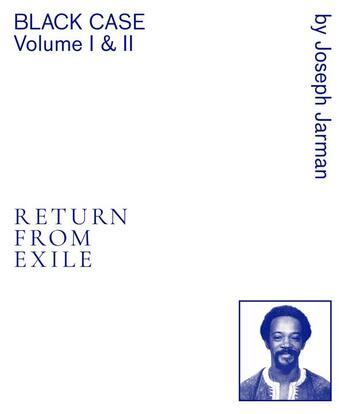Des idées de lecture pour ce début d'année !
Passionné(e) de lecture ? Inscrivez-vous
gratuitement ou connectez-vous pour rejoindre la
communauté et bénéficier de toutes les fonctionnalités du site !

La réédition sous forme imprimée des poèmes révolutionnaires et mystiques de 1974 du jazzman membre fondateur de l'Art Ensemble of Chicago remet en perspective un document essentiel du Black Arts Movement.
Joseph Jarman (1937-2019) était un saxophoniste et multi-instrumentiste américain, membre fondateur du groupe de jazz d'avant-garde emblématique Art Ensemble de Chicago, à l'origine des éléments théâtraux et multimédias de la formation intégrant danse, performance et poésie dans un spectacle total.
Joseph Jarman (1937 - 2019) was a saxophonist and multi-instrumentalist best known as a founding member of trailblazing avant-garde jazz group Art Ensemble of Chicago. Jarman was responsible for the Art Ensemble's signature face paint and elaborate costumes as well as the pioneering theatrical and multimedia elements of their shamanistic performances, which could include dance, comedy, performance art, surreal pranks, and-notably-the recitation of Jarman's poetry.
In 1977, Art Ensemble of Chicago Publishing Co. published Jarman's Black Case Volume I and II: Return From Exile, a collection of writing conceived across America and Europe between 1960 and 1975. Comprised largely of Jarman's flowing, fiery free verse-influenced by Amus Mor, Henry Dumas, Thulani Davis, and Amiri Baraka-the book also features a manifesto for «GREAT BLACK MUSIC,» notated songs, concert program notes, Jarman's photos, and impressions of a play by Muhal Richard Abrams, the founder of the Association for the Advancement of Creative Musicians of which Jarman was also an original member. Jarman writes poetry of personal revolutionary intent, aimed at routing his audience's consciousness towards growth and communication. He speaks with compassionate urgency of the struggles of growing up on Chicago's South Side, of racist police brutality and profound urban alienation, and of the responsibility he feels as a creative artist to nurture beauty and community through the heliocentric music that he considers the healing force of the universe. A practicing Buddhist and proponent of Aikido since a 1958 awakening saved him from the traumatic mental isolation of his time dropped by the US army into southeast Asia, Jarman sings praise for the self-awareness realization possible through the martial arts. With cosmic breath as its leitmotif, his poetry both encourages and embodies a complete relinquishing of ego. While some of the poems contained within Black Case have already been immortalized via performances on classic records by Jarman and Art Ensemble of Chicago, its republication in print form breathes new life into a forgotten document of the Black Arts Movement.
Il n'y a pas encore de discussion sur ce livre
Soyez le premier à en lancer une !

Des idées de lecture pour ce début d'année !

Si certaines sont impressionnantes et effrayantes, d'autres sont drôles et rassurantes !

A gagner : la BD jeunesse adaptée du classique de Mary Shelley !

Caraïbes, 1492. "Ce sont ceux qui ont posé le pied sur ces terres qui ont amené la barbarie, la torture, la cruauté, la destruction des lieux, la mort..."